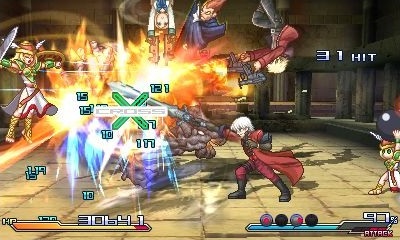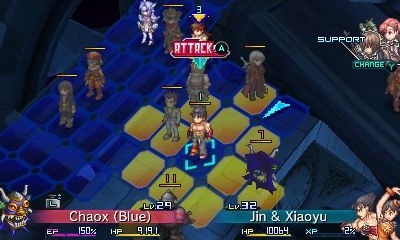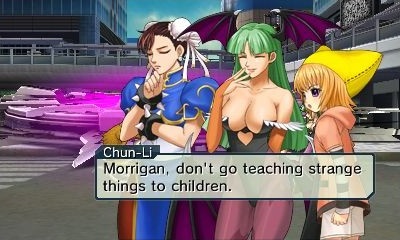Keep your fingers Crossed.
In the absence of what might have been Tekken X Street Fighter, which henceforth shall be forever relegated to the sad, dusty attic shared by Halo: Ghosts and The Last Guardian, Namco Bandai has spent its efforts on a different "Cross" project, a spiritual successor to the nigh-obscure Namco X Capcom released only in Japan for PS2 in 2005. That is to say, Project X Zone is not an original idea, but it might as well be to American audiences. Besides, the mere concept of a crossover, sprite-based TRPG that includes character cameos from the franchises of Namco Bandai, Capcom, and Sega is wacky enough that it can never be boring or completely unoriginal.
Given the required justification for why and how all these heroes gather from across the pantheon of video game brands, it's best to enter the wackadoo storyline with a grain of salt—piles, if need be. The title opens with five prologues (yes, five), each more nonsensical and ridiculous than the last. Case in point, the last prologue introduces Chun-Li from Street Fighter, Rikiya Busujima from Zombie Revenge, and Bruno Delinger from Dynamite Cop investigating an abandoned cruise ship where they find Hsien-Ko from Darkstalkers. They all gather at the pool deck where Morrigan appears on the pool's surface and Lord Raptor arrives with zombie minions, only to be interrupted by Frank West from Dead Rising, who then a few minutes later is interrupted by Chris Redfield and Jill Valentine from Resident Evil, who are then in turn interrupted by Heihachi Mishima from Tekken. (Please open the closest bag of popcorn.)
So for the sake of keeping the main story as spoiler-free as possible and to shield your mind from early onset insanity, the plot can be boiled down to two protagonists, Mii Kouryuuji and her bodyguard Kogoro Tenzai, from which the family's sacred Portal Stone has been stolen by unknown villains. Kogoro, by the way, steals the trophy from Naruto for having the most incomprehensible ninja outfit with a red dress shirt, yellow scarf, and white waistcoat and pants both accented with green jewels and yellow-and-black camouflage. You know, a stealthy outfit, so long as he's galloping with zebras that have stampeded through a Benjamin Moore outlet.
Anyway, this ultimately leads to rifts opening across timelines, allowing characters from other dimensions and universes to collide and validate this game's very existence. Much like the appeal of the comedic, apocalyptic, celebrity-cast film This Is The End, the main draw of Project X Zone is watching and recognizing all of your favorite video game characters come together, with most cutscenes voice-acted in Japanese with English subtitles and accompanied by remixes of the character's themes. The storyline never takes itself too seriously, as it might as well come from the mind of a deranged fanfic writer who doesn't get a lot of sun and believes the voices in his head are actual people. But this is an official storyline, so "Weeeee!"

At first glance, the grid-based RPG may not be the most obvious choice for a crossover title like this, but it does allow for multiple units to be on the battlefield at once and more dialogue interaction between them. Every unit in Project X Zone is comprised of one pair unit and an optional solo unit for assistance, so think of it like a much simpler version of a team from Marvel vs. Capcom. With proper timing, every unit can string three preset combos together so that the enemy remains juggled in the air, and if the unit's XP gauge reaches 100%, the pair can dish out a powerful super attack. On top of that, a solo unit and a support team (that is, any friendly unit one square away) can be called in for additional attacks.
This may sound complicated, but combat becomes quite fluid, despite the overwhelming tutorial dump at the start of the prologue section. The timing window for stringing combos is extremely generous, so the only things you need to worry about are keeping units together in groups of two or more so that they can provide support attacks, having a unit or two whose main job is healing allies from a safe distance, and collecting as many cross hits as possible to build the XP gauge as quickly as possible. Having a stock of XP on hand allows units to use skills as well as defend and counter enemy attacks. Every fallen enemy leaves behind an item as well, so combat never becomes too challenging.
In fact, combat can become too fluid, to the point that's it becomes breezy. Once you figure out how to string combos effectively, every encounter boils down to unit placement. Boss characters usually tend to hang back until you've reached them on the battlefield, so there's time to knock out every minion for experience and items. Then once the boss is engaged, just pound away until it's down for the count. This strategy doesn't change much throughout the game.

While the main campaign lasts longer than 20 hours if you're thorough, Project X Zone suffers from numerous limitations: no multiplayer, no StreetPass functionality, no side missions, no branching storyline options, no store for additional items or equipment, no skill trees, no bonus scenes. All it has is the main campaign and a new game plus that makes enemies harder but awards enough experience (despite it saying otherwise) to even out the increased difficulty.
Despite the lack of depth and the repetition of combat, Project X Zone follows through as a tactical, humorous, preposterous romp through the best hits of video games. Even if you find the combat system strange, the streak of character cameos and the ridiculous number of hits that rack up with every battle will make any hardcore fan smile with appreciation. And if you're anything like me, that's hard to do.
Copy provided by publisher. 3DS exclusive.
-
Fantastical crossover cameos
-
Ridiculous but humorous storyline
-
Remixed character themes
-
Fluid SRPG combat system
-
...that gets repetitive after a while
-
...and lacks depth and features
-
Tutorial dump







